5 Easy Tips to save money when towing your camper
If your next camping trip is only a short drive from home, you probably aren’t too concerned about how much fuel it’s going to take you to get there.
What if you are traveling a few states away, or across the country? If that’s the case, there are a few simple things you can do to give less money to oil companies and keep more in your pocket. Read on for 5 simple ways to save money and get better fuel economy on your next adventure.
Tip 1: Enjoy the drive
Some small changes in your driving style can result in the largest improvement in your gas mileage. These 3 driving tips can improve your MPG by up to 20%. The US Department of Energy has some great resources on fuel economy and the statistics below come for their studies.
1. Don’t try to set a record time
At speeds above 50 mph the fuel economy of most vehicles starts to drop off quickly. On average, every 5 mph you drive over 50 is like paying an additional $0.18 per gallon of gasoline. That’s about $5 extra per tank of gas. So, when traveling on the highway slow down a little and save some money. Just make sure to maintain a safe speed for the surrounding traffic. Driving too slowly can be almost as dangerous as driving too fast.
2. Cruise Control
This next tip is another one for the highway. Cruise control will maintain a constant speed minimizing shifting and revving of your engine, this will result in better fuel economy. There are a few times you don’t want to use cruise control though.
Don’t Use cruise in these conditions
- Heavy Rain or Snow – Your vehicle may unexpectedly downshift causing a loss of traction
- Heavy traffic – keeping your foot in control in heavy traffic will lower the chance rear ending the car ahead of you (unless your vehicle has collision avoidance, but that is another subject)
- Very hilly terrain – Using cruise control on a hilly road can actually decrease your MPG because you vehicle will try to maintain the set speed going up a hill. Slowing down a little may allow you to stay in a higher gear.
3. No drag racing
Rapid acceleration and braking is dangerous, causes more wear on your vehicle and decreases your fuel economy. Studies have shown that aggressive driving habits can increase your fuel consumption by up to 40% and that’s just for an average passenger vehicle! Towing a large camper can amplify the effects of aggressive driving.
Tip: A great way to control your acceleration is to pretend there is an egg between your foot and the gas pedal. When driving try to not crack the egg.
Tip 2: Keep up on Maintenance
Proper maintenance of your vehicle and camper can make a big difference in your fuel economy. Two items that are easy to keep track of are tire pressure and your engine filters and oil.
Tire Pressure
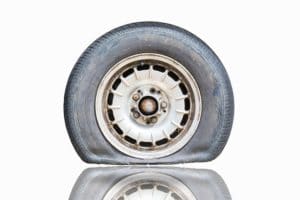
Under inflated tires are one of the most common causes of poor fuel mileage. Besides fuel economy here are a few other reasons to keep an eye on your tire pressure.
- According to the NHTSA 50% of all RV tires are underinflated
- Properly inflated tires improve handling and braking
- According to the Department of Energy a 9 PSI drop in pressure can increase fuel consumption by 4% and shorten tire life by 40%
- A tire over inflated by 20% can shorten tire life by 10%
The affect of low tire pressure on gas mileage was even confirmed by Discovery Channel’s Myth Busters. If you have a newer truck or car that you tow with, it probably monitors your tires and alerts you if the pressure is too low. What about your RV? You have 2 options, either check your tires manually before every trip, or you can install a TPMS or tire pressure monitoring system on your camper. These work just like the one built into your car and will alert you if your tire pressure or temperature changes.
Click here to go the the resource page and see which TPMS system I use
Air Filters and Engine Oil and Sensors
Air Filters
Back before fuel injection and computer controlled engines, a dirty air filter could decrease you fuel mileage by 50%, luckily todays modern engines will dial back the fuel to match the air flow, but you will have a decrease in power.
Engine Oil
Oil keeps all the parts of your engine lubricated and moving freely, but not all oils are the same and they don’t last forever. Over time oil will break down and become “stickier”. This means more power is required just to keep the engine running. Changing your oil at the recommended interval will ensure you engine is running smoothly. Not only that, but make sure to use the right oil for your vehicle. Using a heavier weight oil than required will also increase the resistance and decrease your fuel economy. Lastly, look for an Oil certified by API as “energy conserving” These oils have additives that reduce the friction in your engine making it run more efficiently.
Tip 3: Lighten the load
There is no way around it, the more you tow, the more energy you consume. Think of it like this. Taking a 1 mile long hike doesn’t sound too bad does it? Now how about a 1 mile hike carrying a 4 year old child (trust me it’s harder). The same principle applies to your tow vehicle, so next time you’re packing for a trip, take a little more time and decide if you really need all those things you are loading up.
Tip 4: Avoid Rush Hour in large cities
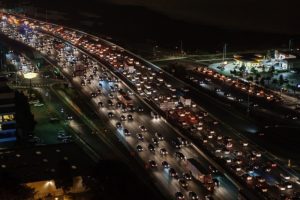
If your engine is running and the wheels aren’t spinning you are wasting fuel. One way to avoid that is to turn the engine off if you are idling. The down side of that method is that it adds wear to your engine and can drain the battery if restarts take place too frequently. A better option is to try to plan your route to avoid major cities at busy times. If you have some flexibility in your schedule missing rush hour traffic can save you gas and avoid the stress of trying get across 3 lanes with camper in bumper to bumper traffic.
Tip 5: Gas Buddy
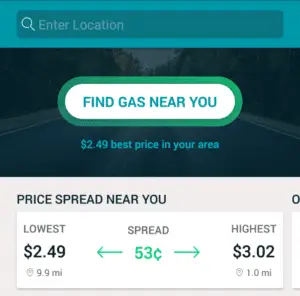
If you haven’t heard of Gas Buddy, it’s an app that’s available for android and iOS devices that shows you the fuel prices in your area. I use gas buddy every time I fill up. Just open up the app and press the “Find Gas Near You” button. In no time a list of the closest stations will appear with the lowest price first. When we are traveling and I start getting close to a ¼ tank, my wife will use the map mode to find the best price along our route.
Gas prices are constantly updated and verified by users of the app and the time and date the price was updated is shown. Occasionally the price has been wrong, but I’ve also saved over $0.50 a gallon by using this app. If you create an account you can earn points by updating prices yourself and be entered to win cash prizes.
Summary
Now, try these tips on your next camping trip. They might not save you thousands of dollars (unless you are on the road full time), but they should save you enough to enjoy something a little extra while you are out camping.
Leave a comment below with your favorite money saving tip and be sure to check out my resource page to see what gear I use for towing and more.
Thanks for reading and happy camping,
Jason
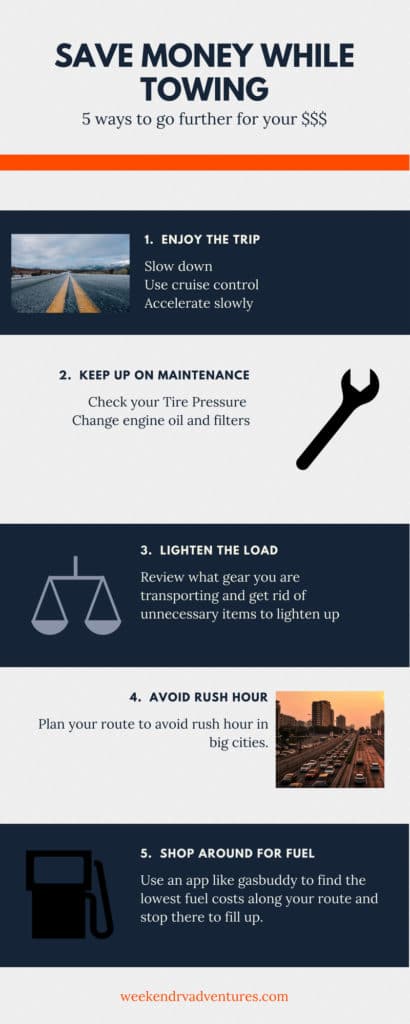

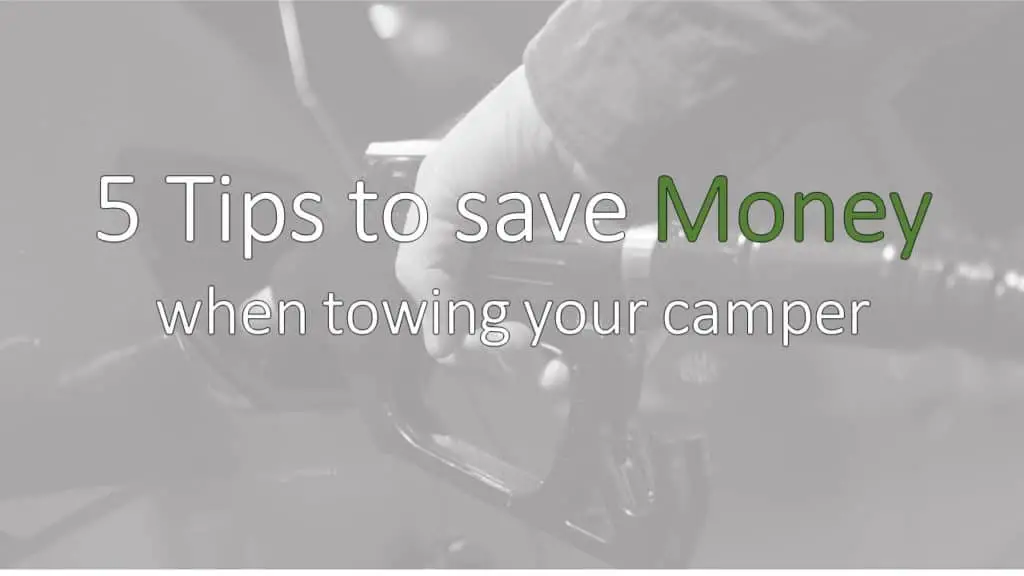
This site give all the information that I needed, thanks that i found this!
Thanks,
Jason
Jason,
I’m learning a lot from your site, glad I found it.
Just started RVing two years ago, there is a lot to learn.
Claude, Thanks for the compliment. I’m glad I have been able to help you out.
Please let me know if you have any other questions.
Jason
Don’t be the Titanic of your towing experience. I see RV’s pushing 70mph at times which is a disaster waiting to happen.
I’ve downloaded the Gas Buddy app, and it’s been very helpful.. thanks.
Thanks, I still use Gas Buddy almost every time I fill up, even when I’m not towing.
Jason